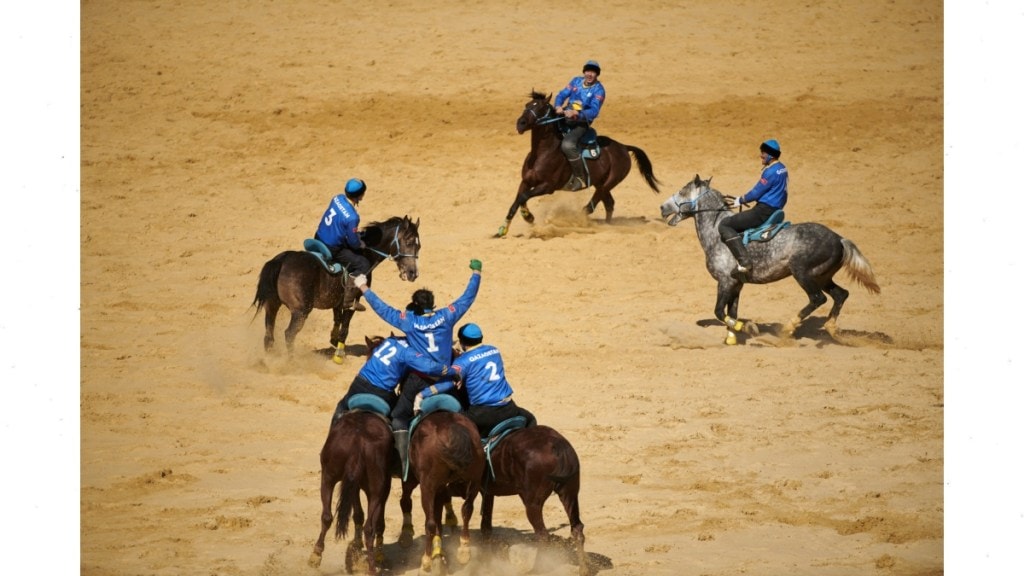By Dr Pravesh Kumar Gupta
Central Asia has a long history of nomadic ways of life. In order to keep alive their nomadic traditions, especially sports, WNG is being organized by Turkic countries. Kazakhstan is hosting the 5th World Nomad Games (WNG) from 8-13 September in the capital city of Astana. The World Nomad Games are international competitions in ethnic sports. The competition is based on the folk games of historically nomadic peoples of Central Asia. WNG is committed to the development of ethno-sports and ethno-cultural movements as human civilization heritage. This international sporting event, which was first created and staged in the Kyrgyz Republic, has grown in popularity worldwide, garnering the attention of a large audience outside of Eurasia. With Kazakhstan gaining the privilege to host the WNG, the number of countries holding the Games has increased.
The 5th World Nomad Games in Astana will be conducted under the theme “The Gathering of the Great Steppe”. The official logo incorporates a key part of identity: a solar horseman. It appears in all of the World Nomad Games logos. The logo has aspects of dark red color. This color evokes the simplicity and beauty of a semiprecious carnelian stone. Carnelian, with its reddish color resembling blood and fire, is connected with life energy, the heart, and the Sun. Carnelian in dark tones was used to embellish domestic objects such as kamshy (whip), belbeu (belt), and traditional jewelry. The text portion of the logo is done in a font style that recalls the runic Turkic script of the XIII-X centuries.
The event stands for maintaining the culture and roots of nomadic peoples while advancing steadily towards modernization. Additionally, it gives the central Asian region’s neighboring countries—which have strong ethnic and cultural ties to one another—a sense of unity and belonging. It’s also a subtle choice to hold this event in Astana. One of Central Asia’s most modern towns, Astana is home to several magnificent buildings of international renown, including the Palace of Peace and Reconciliation. Understanding the foundations of cultural and civilizational values offers the necessary poise for continuous growth and success in this rapidly shifting global geopolitical scene.
The Central Asian countries have been doing really well in modern sports. Recently, in the Olympic Games held in Paris, France and the paralympic Games also held in the same city, the performance of central Asian countries has been commendable. Kazakhstan being the largest in terms of geography and economic potential has a substantial youth population. While doing well in the modern sports, the Kazakh youths are also learning and participating in traditional games. WNG is a great example of this amalgamation of tradition with modernity.
A grand opening ceremony of the WNG was held at Astana arena stadium on September 8. Kazakh President Kasseym Zomart Tokayev was present for the opening ceremony and the ceremony was attended by Uzbek President Shavkat Mirziyoyev, Kyrgyz President, Sadyr Zhaparov, Gurbanguly Berdimuhanedoev, Chairman of the People’s Council of Turkmenistan (Halk maslahaty). This demonstrates the increasing level of cooperation between the Central Asia countries which was not very visible a few years back.
Over 2,500 competitors from about 100 nations will come together in Astana for seven days of competitions that will include sporting events as well as cultural and scientific events. Traditional Kazakh sports such kuresi, kokpar, kusbeglik, asyk atu, aralyspak, and togyzkumalak will be on display at the contests, along with a wide range of other sports with roots in agricultural societies and their own distinctive variations. India has also an age-old tradition of nomadic and tribal culture in the different parts of the country. It has also sent a large contingent to participate in Nomad Games in the categories of traditional Indian sports such wrestling, archery etc. The players from different Indian states namely Uttar Paresh, Punjab, Ladakh among others are participating in these games.
Recently, Kazakhstan faced severe floods and still it has managed to organize this mega event in a successful way which shows the Resilience and commitment to the traditions. Kazakhstan is the land of Al Farabi and Khoja Yasawi which further developed the scientific and humanitarian ideas for mankind. In his remarks at the opening ceremony, Kazakh President Tokayev highlighted the significance of these games as a Commitment to keep the shared nomadic cultural heritage alive. The ancient nomadic values and traditions of the Kazakh Great Steppe should be the ‘Guide for our Future’, said President Tokayev. He also stressed the importance of nomadic people of the great steppe contributing new technologies which helped humanity in a great manner. Kazakhstan’s President emphasized that sports is a symbol of respect and solidarity and its main ambition is to spread friendship amongst nations.
Fifth World Nomad Games organised by Kazakhstan has brought traditional sport enthusiasts from all corners of the world. It will help enhance people-to people contact and cultural connect between the people of the different countries participating in the games. It also has strategic significance for the Republic of Kazakhstan projecting its soft power and leadership of the nomadic way of life in Central Asia.
The author is Associate Fellow (Eurasia), Vivekananda International Foundation, New Delhi.
Disclaimer: Views expressed are personal and do not reflect the official position or policy of FinancialExpress.com Reproducing this content without permission is prohibited.

